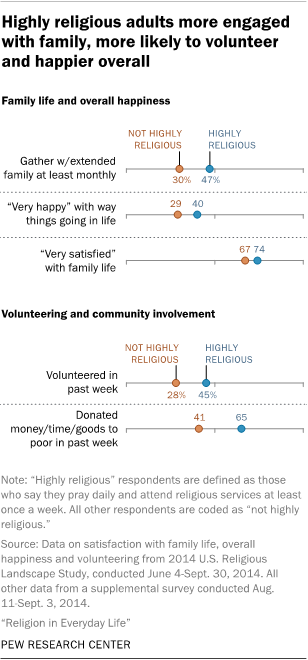Plenty of attention has been paid to the political disagreements between highly religious and less religious Americans, including on social issues such as same-sex marriage and abortion. But there has been less talk about how these groups differ – when they do – in how they live their everyday lives.
Pew Research Center set out to explore this topic from a number of different angles in a new report that is part of our U.S. Religious Landscape Study. Here are three areas where the highly religious – defined in this study as the 30% of U.S. adults who say they pray daily and attend religious services at least once a week – are different from the remaining 70% of the population, and three areas where they are not:
Ways in which the highly religious and less religious are different:
-

On average, Americans who say they attend religious services weekly and pray daily also report being happier than those who are less religiously committed. Four-in-ten highly religious adults say they are generally “very happy,” compared with 29% of those who are less religious. Those who are not highly religious are somewhat more likely than the most devout to say they are “pretty happy” (54% vs. 46%) or “not too happy” (14% vs. 12%).
- Highly religious Americans see their extended families more often. Nearly half (47%) say they do this at least once or twice a month, while only 30% of less religious adults get together with extended family as often. Americans who are not highly religious are twice as likely as those who are highly religious to say they seldom or never attend gatherings with extended family (31% vs. 16%).
- Volunteerism and donations to the poor are especially common practices for those who are highly religious. Among people who pray daily and attend services weekly, 45% also say they volunteered in the past week (including 23% who did so mainly through a church or other religious organization). Just 28% of Americans who are not highly religious say they volunteered in the past seven days. The gap is even bigger when it comes to helping the poor: 65% of the highly religious say they donated money, time or goods to help the poor in the past week, compared with 41% of all other U.S. adults.
Ways in which the highly religious and less religious are not different:
-

Being religiously devout does not make it any more likely that a person will keep one’s cool in stressful situations. Similar shares of those who are highly religious (41%) and not highly religious (43%) say they lost their temper in the past week. The shares of Christians (43%) and religious “nones” (42%) who say they lost their temper are virtually identical.
- While some research has found connections between religiosity and health in certain areas, our new report shows that highly religious people are not very different from those who are less religious in overall satisfaction with the state of their health or in their frequency of exercising and overeating. Roughly the same portions of highly religious people (44%) and people who are not highly religious (43%) say they exercised three or more times in the past week, while similar shares also say they did not exercise at all in the past week (31% and 28%, respectively). And 58% of both those who are highly religious and less religious say they overate in the past seven days.
- While some religious leaders emphasize care for the environment as part of their religious teaching – including Pope Francis in an encyclical he released last year – there are no differences between the highly religious and others when it comes to recycling habits. Nearly half of those in each group say they recycle “whenever possible,” while only 4% in both groups say they “never” recycle. Similarly, about a quarter of those who are highly religious and those who are not say they take a company’s record of environmental responsibility into account as a major factor when making purchasing decisions.
